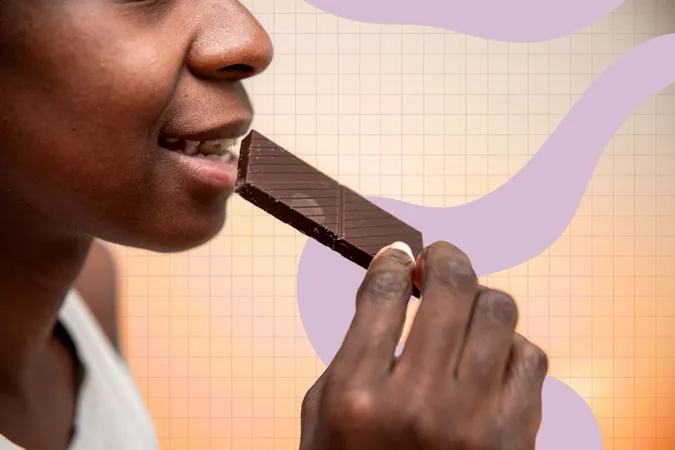
Attention, Chocolate Lovers! New Study Reveals Dark Chocolate Could Slash Your Diabetes Risk by 21%!
2024-12-12
Author: Jia
If you're a chocolate addict, you might be in luck! In an astonishing revelation, a recent study suggests that indulging in dark chocolate could significantly reduce your risk of developing type 2 diabetes. With Americans spending nearly $26 billion on chocolate in 2023—a staggering 5.8% increase from the previous year—it's clear that the world has a sweet tooth. But is all chocolate created equal when it comes to health benefits? Spoiler alert: It’s not!
The new research from Harvard, published in The BMJ on December 4, 2024, dives deep into the connection between chocolate consumption and diabetes risk. While chocolate is often maligned for its sugar and saturated fat content, dark chocolate, in particular, may hold the key to better health.
How Was the Study Conducted?
Researchers analyzed data from three extensive cohort studies, incorporating nearly 300,000 participants: the Nurses’ Health Study (NHS), initiated in 1976, the Nurses’ Health Study II (NHSII), which began in 1989, and the Health Professionals Follow-up Study (HPFS) from 1986. The study looked at data from 1986 to 2018 for NHS, 1991 to 2021 for NHSII, and 1986 to 2020 for HPFS.
Participants were asked about their chocolate consumption through food frequency questionnaires every four years. Notably, specific questions about the types of chocolate—dark, milk, and white—were incorporated only after 2006. This meticulous methodology allowed researchers to track changes in dietary habits and associated health risks while accounting for various lifestyle factors, like obesity and physical activity levels.
Groundbreaking Findings
The results were nothing short of fascinating! Participants who enjoyed at least five servings of any chocolate weekly had a 10% lower risk of type 2 diabetes compared to those who seldom indulged. When the focus shifted specifically to dark chocolate, consumption of at least five servings per week correlated with an impressive 21% reduction in diabetes risk.
What’s more? Individuals who adhered to a higher-quality diet (as assessed by the Alternate Healthy Eating Index-2010) experienced an even more remarkable 34% decrease in diabetes risk when they consumed five servings of dark chocolate each week.
Additionally, the study uncovered that milk chocolate could be linked to increased weight gain compared to dark chocolate, adding another layer to the health conversation regarding our favorite treats.
The Science Behind the Sweetness
So, what makes dark chocolate so special? The answer lies in its rich content of polyphenols, particularly flavan-3-ols, which are antioxidants known for improving insulin sensitivity and protecting pancreatic cells. These compounds can also lower inflammation levels, enhancing glucose metabolism and further reducing the risk of type 2 diabetes.
But here's the catch—although dark chocolate has distinct advantages, moderation is key. Experts recommend sticking to about 1 to 2 ounces of dark chocolate per day to maximize benefits without overindulging.
A Guide to Choosing Dark Chocolate
When selecting dark chocolate, aim for products with a high percentage of cocoa. The higher the cocoa content, the more pronounced the health benefits. While there are no strict definitions for what constitutes dark chocolate, generally, 70% cocoa or higher is considered optimal. If you're transitioning from milk to dark chocolate, start with lower cocoa percentages and gradually increase to help your palate adjust.
Conclusion
In summary, this groundbreaking study has unveiled that indulging in dark chocolate may indeed lower your risk of type 2 diabetes by as much as 21%, and potentially up to 34% for those following a nutritious diet rich in fiber and antioxidants. This exciting finding underlines the importance of a well-rounded diet alongside healthy lifestyle choices, including physical activity and stress management, in the pursuit of optimal health. So, keep your chocolate cravings in check and treat yourself wisely—your future self may thank you!








 Brasil (PT)
Brasil (PT)
 Canada (EN)
Canada (EN)
 Chile (ES)
Chile (ES)
 España (ES)
España (ES)
 France (FR)
France (FR)
 Hong Kong (EN)
Hong Kong (EN)
 Italia (IT)
Italia (IT)
 日本 (JA)
日本 (JA)
 Magyarország (HU)
Magyarország (HU)
 Norge (NO)
Norge (NO)
 Polska (PL)
Polska (PL)
 Schweiz (DE)
Schweiz (DE)
 Singapore (EN)
Singapore (EN)
 Sverige (SV)
Sverige (SV)
 Suomi (FI)
Suomi (FI)
 Türkiye (TR)
Türkiye (TR)